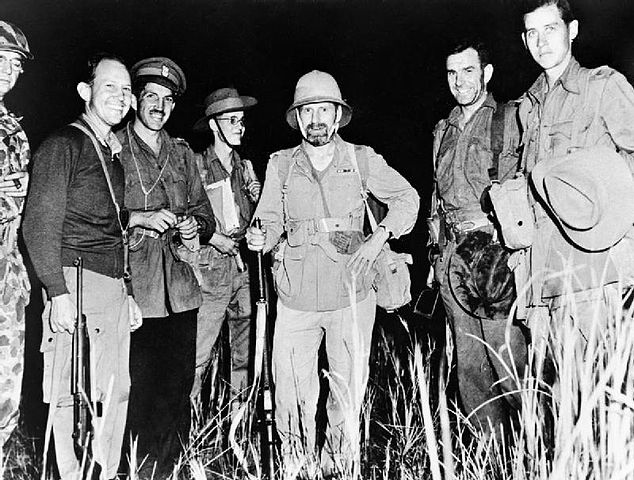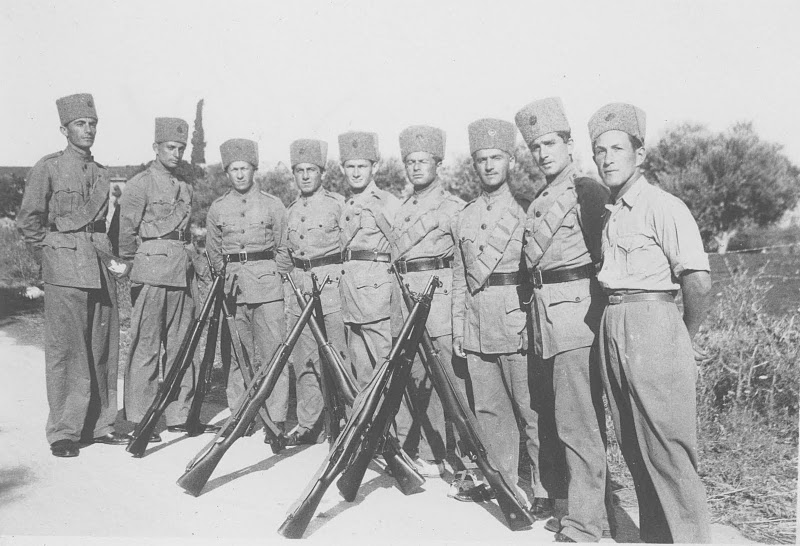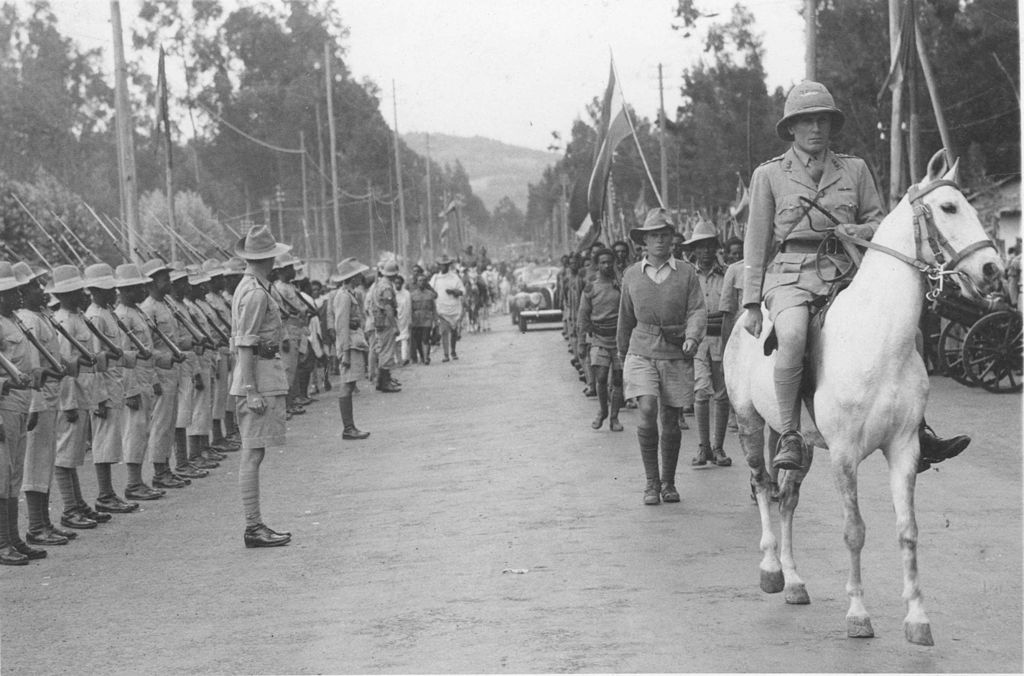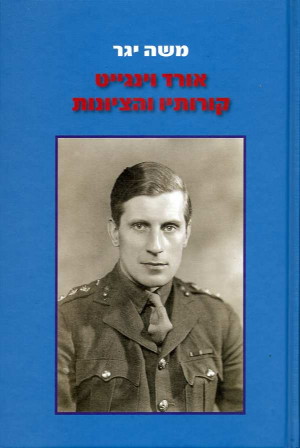Orde Wingate was an exceptional Englishman, commander, person, and Zionist. His unique character is now discussed in a new biography.
Imagine an English officer who enjoyed walking around as naked as on the day he was born, happily munched away on raw onions, wrote blistering reports on his colleagues, defied his superiors, ran roughshod over his subordinates, ridiculed authority and rules, and was careless in his manners and impatient with mediocrity.
Now imagine that this was the first Chief of Staff of the Israeli Army.
That almost happened. If Orde Wingate had survived the battles of Burma in World War II, his dream of standing at the head of a Jewish army, which was also the dream of the leaders of the Yishuv in the Land of Israel, would likely have come to fruition. Moshe Yegar’s new book, Orde C. Wingate: His Life and Zionism (Bialik Institute, in Hebrew), attempts to explain the link between Wingate and Zionism by telling the story of his short life.
A Military Genius
Needless to say, it was not Wingate’s strange habits that made him a likely candidate for the first chief of staff of the Jewish state. Those habits were forgiven on account of his military genius. Wingate’s military career was filled with victories; there were no failures in it. He succeeded thanks to his unique military creativity, his absolute understanding of the utilization of force, and his exceptional ability to command, defeating large forces with small ones that were often assembled from the threshing-floor and the wine cellar. He did this in a limited way in Palestine, more broadly in battles in Ethiopia, and on a still larger scale in the fighting in Burma, where he built the famous force of “Chindits.”

At a time when the Allied Forces were being hit hard on all fronts, Wingate’s accomplishments stood out in ways that brought him to the attention of Roosevelt and Churchill; the latter even gave him free rein to contact him. War is a true time of testing, when mediocre commanders are distinguished from the good ones and the good ones from the excellent. Wingate belonged to the last category; and despite all his strangeness and his eventual mental crisis (caused by malaria, apparently), he had a meteoric rise on the ladder of command and in the level of forces assigned to him.
Wingate was “the real deal.” Bernard Ferguson, an officer who served under him in two battles in Burma, put it this way:
His standard was perfection, nothing less. . . . No other officer was capable of dreaming a dream, making a plan, assembling the necessary force, training it, inspiring it and leading it. There are those who excel in planning, or in training or in leadership. Here was a man who excelled in all three, and whose vision at the drawing board was equal to his genius on the battlefield.
Wingate’s sudden and mysterious death, as a result of the crash of his plane in the third week of his second battle in Burma, cut short a career that would have become more glorious in the course of the war and aided the Zionist cause when the war was over. Like every outstanding man in a hierarchical order, Wingate had no shortage of enemies in the British army; but on account of his abilities, he became famous worldwide during and after World War II. As Moshe Yegar writes, “It is doubtful that any other soldier who held the rank of a mere major general experienced such a deluge of publicity of all sorts and generated such wide interest.”
Teaching Zionism to the Zionists
Wingate was in Palestine for only two-and-a-half years altogether, but in this short time he put his stamp on the Yishuv’s concept of active defense by means of his establishment of “Special Night Forces.” He developed a military doctrine and imparted self-confidence to a generation of Israeli commanders; he also provided a personal example as a commander who was always out in front of his men and continued to remain in charge in battle even when he was wounded and still under fire. He helped, to the best of his abilities, with the British, and sought to convince them, on the basis of British imperial interests, of the necessity of building a Jewish force in the Land of Israel. He joined the Zionist and pro-Zionist leadership circles and made contributions to them that were far beyond what was permissible for a British officer.

To a large extent, Wingate gave the leaders of the Zionist movement a lesson in Zionism and political realism. More than once he rebuked them for their timidity (both in their “self-restraint” and in their diplomacy vis-à-vis the British) and their lack of comprehension of the greatness of the historical hour. David Hacohen reports what Wingate said to him in their first meeting in 1936:
You should know, I am a Zionist with my whole heart. I feel myself indebted to you. I have spent a great deal of time reading the Bible, the eternal Book of Books, the glorious creation of the people of Israel, an eternal testimony to its life in this country. . . . It is my privilege to assist you in fighting your wars, and to that I will devote the better part of my life. . . . Everyone who raises a hand against you or your enterprise of reviving your land has to be fought against. If the neighboring nation intends to rise against you, on account of envy, ignorance, or twisted ideas . . . and for “political reasons” it also finds supporters among my people, I will fight with you against the one and the other.
In Palestine, Wingate quickly became close to Chaim Weizmann and Moshe Shertok (Sharett), the heads of the Haganah, and many other notables among the leadership of the Yishuv. When his views are taken into consideration, there is nothing surprising about this. For instance, in a letter he wrote to his uncle, he expressed an aspiration for the creation of a Jewish state on both sides of the Jordan through the removal of “the corrupt Abdullah,” belittled the military capacity of the Arab states, and sharply denounced those British who admired the Arabs and opposed the Jews. In one speech to his soldiers he said, “God will help us to kill all the enemies of the Jews, for the enemies of the Jews are the enemies of all mankind.” With respect to the holiness of Jerusalem to the Arabs he said that “the entire Muslim claim to the Dome of the Rock is based on a story that is considered today, at least, to be as baseless as the ‘Arabian Nights’” by everyone except the most fanatic Muslims.” And there is much more in the same vein. Many Jews testify that one heard from Wingate Zionism of the sort that their Zionist leadership didn’t dare to put into words.
It is no wonder, therefore, that many of the British recoiled from him, and they quickly removed him from service in Palestine. Indeed, not just the British, but also some leading Zionists regarded him as too intense a Zionist. Yet Wingate the realist knew what he was talking about, for he analyzed historical events better than they did. He foresaw the Second World War and understood that Chamberlain was bringing it nearer through his efforts to appease Hitler. Moreover, he understood that the Jews would pay a price for this attitude. In relation to this matter he criticized the conciliatory stance of the Zionist leadership toward the British. This, for example, is what he said to Dov Yosef of the Jewish Agency at the end of 1938:
If I were Dr. Weizmann, I would make it my goal to enter somehow into the office of Mr. Chamberlain . . . . and I would say to him: “You have just destroyed Czechoslovakia, and how it seems that you are planning to deal with the Jews in the same way. . . . We will oppose with force every attempt to deny us our rights and we will fight you to the end.” . . . Then I would turn around and leave the room. . . . I know my fellow countrymen. If he [Chamberlain] would not call out to Dr. Weizmann to return before he left the room, he would certainly bring him back to London before he would get very far on his trip back to Palestine.
But this wasn’t the attitude taken by Weizmann and others. Similar disputes arose between Wingate and the Zionist leaders with regard to the creation of Jewish units to fight on the Western front. There was a personal dimension to this debate. When the British promised to set up a Jewish force (a promise that was broken), Ben-Gurion and Weizmann did not insist on having Wingate lead it, and thus did not keep faith with the greatest supporter of Zionism and the only military man who could have used this opportunity to build a proper Jewish army.

A Perfect Zionist Storm
The question of what turned Wingate into such a Zionist is the focus of Moshe Yegar’s book and is supposed to distinguish it from other treatments of his career. But the answer is not so mysterious. His arrival in the Land of Israel was for Wingate a “perfect storm.” Assistance for persecuted and weak Jews followed from his moral beliefs; he was a great devotee of the Bible and the Land of Israel; corresponding religious beliefs stirred his heart; his physical and intellectual way of life sank deep roots in the land; and, of course, the struggle that took place in Palestine fit his military genius like a glove.
It is the book’s good fortune that the author does not restrict himself to the Zionist connection and tells Wingate’s life story, including the battles in Ethiopia and Burma, intentionally leaving out the military aspects (but the reader will in any case understand that he has a military genius before him). In addition, Yegar surveys and judges the critique of Wingate by the “new historians” as well as the connection of the Wingate family to the country through his memorialization throughout Israel. An interesting point, which requires an investigation that is absent from the book, is the great resemblance between the views of Wingate and those of Jabotinsky and other Revisionists, which was—in military as well as diplomatic matters—greater than their resemblance to the views of the leaders of the Zionist establishment.
Wingate’s story inspires and educates the reader from a number of points of view. He was an exceptional man with a special interest in Israel. His aggressiveness, creativity, realism, leadership, command, the hate that was directed against him on account of his eccentric genius, his contempt for mediocrity and, of course, the Zionism that burned with him generate great historical and practical interest and give the reader much food for thought.
The review was translated and published by Jewish Ideas Daily.




